Unit 1 What's the matter
人教版初二(下)英语unit1 what's the matter知识点讲解与练习

八年级下册英语Unit 1 what’s the matter?词汇篇学生通过本讲学习,能够掌握本单元的重点词汇句型,并在综合能力上有一定的拓展。
1.matter的用法(1)名词:事情,问题What’s the matter? =what’s wrong (with you)? =what’s the trouble怎么啦?出什么事啦?(2)动词:有重大影响,有重要性如:What does it matter?2.疾病的表达法have a cold/a fever/ a toothache/ a stomachache3.take 的固定搭配take one’s temperature/ take breaks/ take risks/take some medicine/take off/ take care of/take away 4.surprise的用法1.做名词:to one’s surprise 使。
惊讶的,出乎。
意料2.做动词:surprise sb使某人吃惊3.做形容词:surprising, surprised的用法5.get的用法get off下车/get on上车/get into陷入,参与6.be used to sth/doing sth 习惯于做某事be used to do sth 被用作去做某事used to do sth 习惯于做某事7.out of的固定搭配look out of 向。
外看/ get out of从。
出来/ run out of用光基础演练1.---What’s wrong ______you?---I fell off the bike and hurt my leg.A. ofB. withC. forD. by2.Tom and Jenny enjoyed _________playing computer games.A. himselfB. herselfC. ourselvesD. themselves3. Sally became interested ___________science and wanted to be a scientist.A. forB. inC. throughD. at4. ---I had a __________.---You’d better go to see a dentist.A. headacheB. feverC. coldD. toothache5. I didn’t _________my temperature, but I knew I had a fever.A. giveB. setC. takeD. show二、根据汉语意思翻译句子。
Unit1-what's-the-matter-教材语法解析
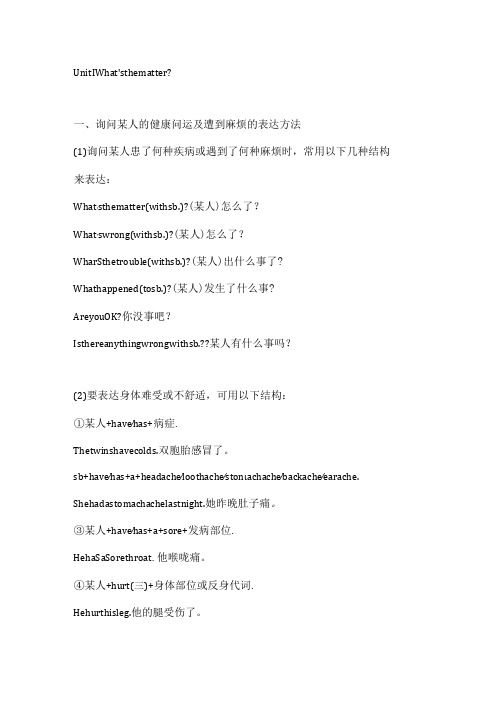
UnitIWhat'sthematter?一、询问某人的健康问运及遭到麻烦的表达方法(1)询问某人患了何种疾病或遇到了何种麻烦时,常用以下几种结构来表达:What,sthematter(withsb.)?(某人)怎么了?What,swrong(withsb.)?(某人)怎么了?WharSthetrouble(withsb.)?(某人)出什么事了?Whathappened(tosb.)?(某人)发生了什么事?AreyouOK?你没事吧?Isthereanythingwrongwithsb.??某人有什么事吗?(2)要表达身体难受或不舒适,可用以下结构:①某人+have∕has+病症.Thetwinshavecolds.双胞胎感冒了。
sb+have∕has+a+headache∕loothache∕stonιachache∕backache∕earache. Shehadastomachachelastnight.她昨晚肚子痛。
③某人+have∕has+a+sore+发病部位.HehaSaSorethroat.他喉咙痛。
④某人+hurt(三)+身体部位或反身代词.Hehurthisleg.他的腿受伤了。
⑤某部位+hurl(三).Myheadhurtsbadly.我头痛得厉害。
⑥某人+have∕has+apain+inone's+身体部位Ihaveapaininmychest.我胸口痛⑦(Thereis)soιnethingwrongwithone's+身体部位. Thereissomethingwrongwithmyrighteye.我的右眼有毛病。
⑧其他表达方式Shehasahearttrouble.她有心脏病。
Hegothitonthehead他头部受到了撞击。
Shecutherfinger.她割破手指了。
二、情态动词should的用法1.ShOIIld为情态动词,意为“应当:应当”,否定式为ShoUkIn'1,其后接动词原形,无人称和数的改变。
【中考考纲词汇详解】Unit1 What’s the matter

n.
情况,状况
真题例句
The situation became worse and worse.
情况变得越来越坏。
['kiːləʊ]
n.
千克;公斤
词形变化
kilogram千克
经典例句
Her weight has increased to 70 kilos.
她的体重增加到了70公斤。
['mætə(r)]
n.
事情,物质
常考词组
no matter无论
as a matter of fact事实上
经典例句
It doesn’t matter.没关系
[bæk]
n.
adv.
adj.
后部,背
向后
后面的
常考词组
at the back of在…的后面
come back回来
经典例句
There used to be a big and beautiful garden at the back of their house.
真题例句
My face hurt while I was walking down the street just now.
刚才当我沿着街走时,我的脸受伤了。
[hɪt]
v.
击,打
词形变化
过去式.过去分词:hit
真题例句
It is reported that a terrible rainstorm hit the south of our country last night.你看来累了。你需要 Nhomakorabea好休息一下。
[kɒf]
v.& n .
现行人教版英语8下Unit 1 What's the matter?重点知识讲解
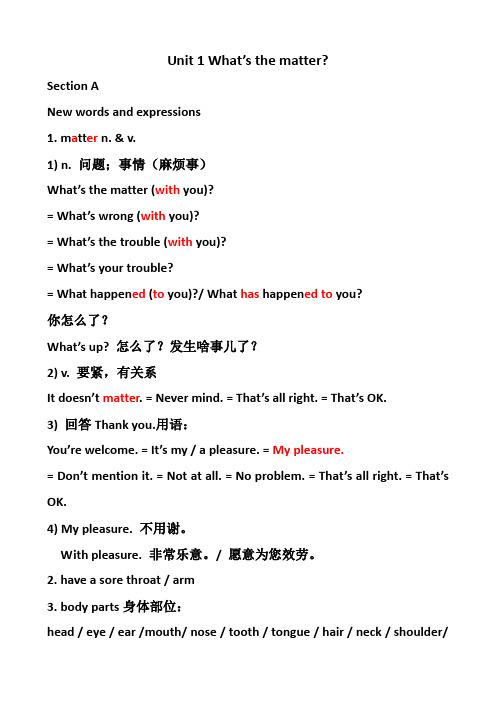
Unit 1 What’s the matter?Section ANew words and expressions1. m a tt er n. & v.1) n. 问题;事情(麻烦事)What’s the matter (with you)?= What’s wrong (with you)?= What’s the trouble (with you)?= What’s your trouble?= What happen ed (to you)?/ What has happen ed to you?你怎么了?What’s up? 怎么了?发生啥事儿了?2) v. 要紧,有关系It doesn’t matter. = Never mind. = That’s all right. = That’s OK.3) 回答Thank you.用语:You’re welcome. = It’s my / a pleasure. = My pleasure.= Don’t mention it. = Not at all. = No problem. = That’s all right. = That’s OK.4) My pleasure. 不用谢。
With pleasure. 非常乐意。
/ 愿意为您效劳。
2. have a sore throat / arm3. body parts身体部位:head / eye / ear /mouth/ nose / tooth / tongue / hair / neck / shoulder/arm / hand / finger / nail / leg / knee / foot / toe / wrist / a ncle(脚踝)/elbow(手肘,胳膊肘)angle Cn. 角tri angle 三角形angel Cn. 天使4. Sb. have a headache. = Sb.’s head aches / hurts.= Sb. have a pain in the head.= Sb.’s head is painful. 某人头疼。
Unit1-what's-the-matter-教材语法解析
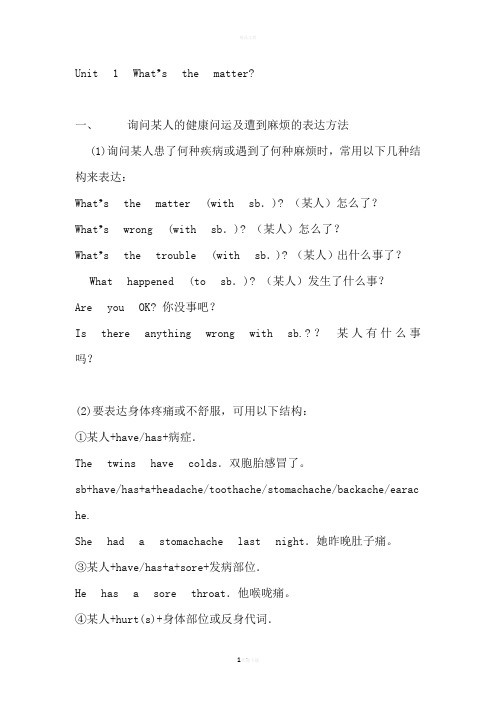
Unit1What’s the matter?一、询问某人的健康问运及遭到麻烦的表达方法(1)询问某人患了何种疾病或遇到了何种麻烦时,常用以下几种结构来表达:What’s the matter(with sb.)? (某人)怎么了?What’s wrong(with sb.)? (某人)怎么了?What’s the trouble(with sb.)? (某人)出什么事了?What happened(to sb.)? (某人)发生了什么事?Are you OK? 你没事吧?Is there anything wrong with sb.??某人有什么事吗?(2)要表达身体疼痛或不舒服,可用以下结构:①某人+have/has+病症.The twins have colds.双胞胎感冒了。
sb+have/has+a+headache/toothache/stomachache/backache/earac he.She had a stomachache last night.她昨晚肚子痛。
③某人+have/has+a+sore+发病部位.He has a sore throat.他喉咙痛。
④某人+hurt(s)+身体部位或反身代词.He hurt his leg.他的腿受伤了。
⑤某部位+hurt(s).My head hurts badly.我头痛得厉害。
⑥某人+have/has +a pain +in one’s+身体部位I have a pain in my chest.我胸口痛⑦(There is)something wrong with one’s+身体部位.There is something wrong with my right eye.我的右眼有毛病。
⑧其他表达方式She has a heart trouble.她有心脏病。
He got hit on the head他头部受到了撞击。
Unit1 What’s the matter
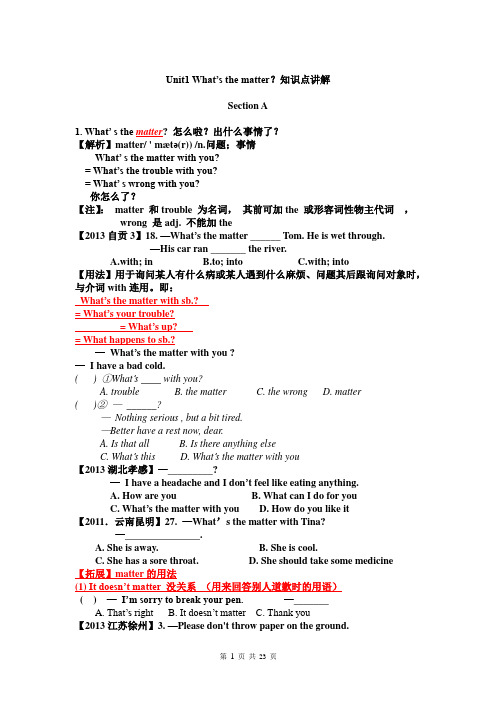
Unit1 What’s the matter?知识点讲解Section A1. What’ s the matter? 怎么啦?出什么事情了?【解析】matter/ ' mætə(r)) /n.问题;事情What’ s the matter with you?= What’s the trouble with you?= What’ s wrong with you?你怎么了?【注】:matter 和trouble 为名词,其前可加the 或形容词性物主代词,wrong 是adj. 不能加the【2013自贡3】18. —What’s the matter ______ Tom. He is wet through.—His car ran _______ the river.A.with; inB.to; intoC.with; into【用法】用于询问某人有什么病或某人遇到什么麻烦、问题其后跟询问对象时,与介词with连用。
即:What’s the matter with sb.?= What’s your trouble?= What’s up?= What happens to sb.?—What’s the matter with you ?—I have a bad cold.( ) ①What’s ____ with you?A. troubleB. the matterC. the wrongD. matter( )②—______?—Nothing serious , but a bit tired.—Better have a rest now, dear.A. Is that allB. Is there anything elseC. What’s thisD. What’s the matter with you【2013湖北孝感】—_________?—I have a headache and I don’t feel like eating anything.A. How are youB. What can I do for youC. What’s the matter with youD. How do you like it【2011.云南昆明】27. —What’s the matter with Tina?—_______________.A. She is away.B. She is cool.C. She has a sore throat.D. She should take some medicine【拓展】matter的用法(1) It doesn’t matter 没关系(用来回答别人道歉时的用语)( ) —I’m sorry to break your pen. —_______A. That’s rightB.It doesn’t matterC. Thank you【2013江苏徐州】3. —Please don't throw paper on the ground.—________,I won't.A. Excuse meB. That's all rightC. SorryD. It doesn't matter【2013黑龙江齐齐哈尔】17.-I have a pain in my back.-_____ . You’d better see a d octor.A. I’m sorry to hear thatB. Nothing seriousC. It doesn’t matter【2013湖北武汉】39. —I’m very sorry. I broke your tea cup.—__________.A. It doesn’t matterB. You’d better notC. Take it easyD. It’s too bad【2013四川广安】26.—Sorry, I'm late again.—______.A.That’s OK B.It doesn't matter C.Good idea (2) as a matter of fact= in fact 事实上, 实际上2. I have a cold 我感冒了I have a stomachache 我患胃痛I have a sore back. 我背痛。
Unit 1 What’s the matter_主要知识点整理
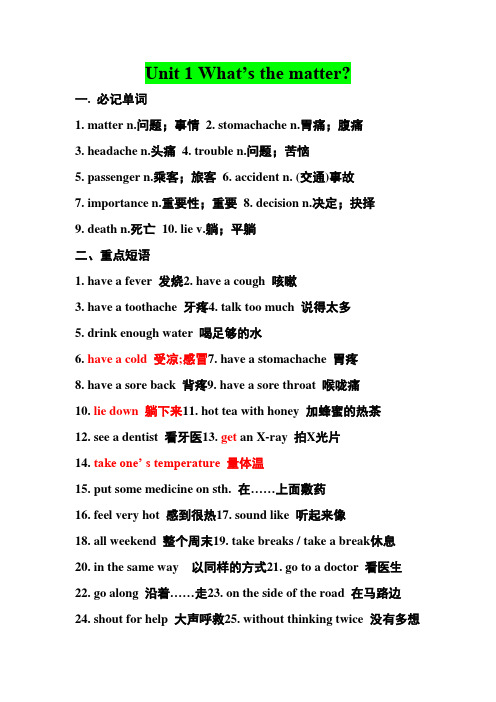
Unit 1 What’s the matter?一. 必记单词1. matter n.问题;事情2. stomachache n.胃痛;腹痛3. headache n.头痛4. trouble n.问题;苦恼5. passenger n.乘客;旅客6. accident n. (交通)事故7. importance n.重要性;重要8. decision n.决定;抉择9. death n.死亡10. lie v.躺;平躺二、重点短语1. have a fever 发烧2. have a cough 咳嗽3. have a toothache 牙疼4. talk too much 说得太多5. drink enough water 喝足够的水6. have a cold 受凉;感冒7. have a stomachache 胃疼8. have a sore back 背疼9. have a sore throat 喉咙痛10. lie down躺下来11. hot tea with honey 加蜂蜜的热茶12. see a dentist 看牙医13. get an X-ray 拍X光片14.take one’ s temperature 量体温15. put some medicine on sth. 在……上面敷药16. feel very hot 感到很热17. sound like 听起来像18. all weekend 整个周末19. take breaks / take a break休息20.in the same way 以同样的方式21. go to a doctor 看医生22. go along 沿着……走23. on the side of the road 在马路边24. shout for help 大声呼救25. without thinking twice 没有多想26. get off 下车27. have a heart problem 有心脏病28. to one’ s surprise 使.......惊讶的29. thanks to 多亏了;由于30. in time 及时31. think about doing 考虑做某事32. save a life 挽救生命33. get into trouble 造成麻烦34. right away 立刻;马上35. because of 由于36. do the right thing做正确的事37. get out of 离开;从……出来38. hurt oneself 受伤39. get hit / sunburned 被打击/晒伤40. put a bandage on sth. 用绷带包扎41. fall down 摔倒42. feel sick 感到恶心43. have a nosebleed 流鼻血44. cut his knee 割伤他的膝盖45. put her head back 把她的头向后仰46. have problem s breathing 呼吸困难47. go mountain climbing 去爬山48. be used to doing sth. 习惯做某事49. run out (of) 用完;用尽50. so that 以便51. so. . . that 如此… …以致于…52. be in control of 掌管;管理53.in a difficult situation 在困境中54. keep on doing sth. 继续或坚持做某事55. make decisions / make a decision 做出决定56. take risks / take a risk冒险57. give up doing 放弃做某事58. agree to do sth. 同意做某事59. cut off 切除60. lose one’s life 失去生命三.经典句型1. What’ s the matter with you?= What’s the trouble with you?= What’ s wrong with you?你怎么了?2. What should she do? 她该怎么办呢?Should I take my temperature? 我应该量一下体温吗?主语+ should/shouldn’t + 动词原形. ..①You should lie down and rest. 你应该躺下休息一会儿。
Unit1 What's the matter 短语总结-背诵版

Unit1What's the matter?短语总结—背诵版一、短语总结1.“(某人)怎么了?”表达(3+2+1+1)1.What’s the matter/trouble/problems(with sb.)?2.What’s wrong/up(with sb.)?3.(Is there)anything wrong(with sb.)?4.What happened to sb.?2.happen(意外地)发生(happen-happened-happened)1.take place(有计划地)发生2.take one’s place=take the place of sb.取代/代替某人的位置3.sth.happen(ed)to sb.某事发生在某人身上4.sb.happen(ed)to do sth.某人碰巧做某事3.“身体部位疼痛or不舒服”的表达(4)1.have a+疾病名词(headache/stomachache/toothache/其他疾病)2.have a sore+身体部位3.身体部位+hurt(s)4.have a pain in the+身体部位4.accident1.accidental adj.意外的accidentally adv.意外地2.by accident=accidentally意外地3.by mistake错误地5.lie1.lie in位于......(内部)2.lie to位于......(相隔海/省)3.lie on位于......(接壤)4.Iie ylie躺;位于lie-lay-lain lying lie down躺下lie on/in/to位于撒谎lie-lied-lied lie to sb.对某人撒谎lie about sth.对某事撒谎lay放置;下蛋lay-laid-laid laying lay down放下6.上下车1.get on/off+a/the bus/plane/train/metro/subway2.get in/into/out of+a/the taxi/car/van7.think v.思考;认为(think-thought-thought)1.think about思考;考虑2.think over=think about carefully仔细考虑3.think of认为;想起What do you think of...?=How do you like...?你认为...怎么样?4.think twice再三考虑;谨慎考虑8.surprise n./v.(surprise-surprised-surprised)1.to one’s surprise令某人吃惊的是2.in surprise=surprisingly吃惊地3.be surprised at对......感到吃惊4.be excited about对......感到激动5.be interested in对......感兴趣9.trouble n.麻烦(不可数)1.have trouble/problems/difficulty(in)doing sth.做某事有麻烦/问题/困难2.get into trouble陷入麻烦3.be in trouble在麻烦中10.fall v./n.(秋天)(fall-fell-fallen)1.fall behind sb.落后某人catch up with sb.赶上某人2.fall in love with sb./sth.爱上...../与......相爱3.fall down掉下4.fall over摔跤5.fall down from...=fall off...从......掉下6.fall asleep睡着11.run v.跑/经营(run-ran-run)1.run after...追赶...2.run away逃跑3.sb.run out of sth.某人用光/耗尽某物4.sth.run out某物花光/耗光5.run a shop/company/restaurant经营一家商店/公司/餐馆e n./v.使用(use-used-used)1.be useful=be of use有用的2.be useless=be of no use没有用的3.be used to(doing)sth.习惯于(做)某事4.be used to do sth.被用来做某事ed to do sth.过去常常做某事13.help n./v.帮助(help-helped-helped)1.help(sb.)to do sth.帮助某人做某事2.help sb.with sth.在某方面帮助某人3.can’t help doing sth.情不自禁/忍不住做某事4.help oneself to sth.自便/自取......(随便吃/喝......)5.with one’s help=with the help of sth.在某人的帮助下6.ask sb.for help=turn to sb.向某人寻求帮助14.own adj.自己的v.拥有(own-owned-owned)owner n.拥有者1.sb.own sth.=sb.be the owner of sth.某人拥有某物2.on one’s own=by oneself=alone独自地3.one’s own+n.(单/复)某人自己的......15.mean v.意思是/打算(mean-meant-meant)adj.刻薄的;吝啬的meaning n.意思;意义meaningful adj.有意义的meaningless无意义的1.mean to do sth.打算做某事2.mean doing sth.意味着做某事16.mind v.介意/在意(mind-minded-minded)n.决心;心智;思想;头脑1.make up one’s mind(to do sth.)下定决心(做某事)2.change one’s mind改变某人的主意3.keep......in mind记住......4.lose one’s mind失去理智;发疯5.in one’s mind=in one’s opinion=in one’s view在某人看来6.mind sb./one’s doing sth.介意某人做某事7.Never mind.(用于安慰)没关系;别担心;不要紧17.cut v.切割/砍(cut-cut-cut)1.cut up=cut...into pieces切碎2.cut off切掉3.cut down砍倒4.cut...in half对半切开18.keep v.保持;继续(keep-kept-kept)1.keep doing sth.保持做某事2.keep sb.doing sth.让某人保持做某事3.keep on doing sth.=go on doing sth.继续做某事4.keep/stop sb.from doing sth.阻止某人做某事19.risk(risk-risked-risked)1.be at risk=be in danger有危险的/在危险中2.take a risk=take risks冒险3.take the risk of sth.=be at the risk of sth.冒着......的风险4.risk doing sth.冒险做某事20.expect v.期待(expect-expected-expected)1.expect(sb.)to do sth.期待(某人)做某事2.expect that从句期待+宾语从句21.sick adj.生病的(定语、表语)ill adj.生病的(只作表语)1.sick-sicker-sickest ill-worse-worst2.be sick of sth.厌烦某事3.be tired of sth.厌倦某事22.breath n.呼吸breathe v.呼吸(breathe-breathed-breathed)1.breathe fresh air呼吸新鲜空气2.hold one’s breath屏住呼吸3.take a deep breath深呼吸4.be out of breath上气不接下气23.ready adj.准备好的1.get/be ready to do sth.准备好做某事2.get/be ready for sth.为......做好准备24.其他短语1.be in control of sth.控制/掌管/管理某事2.take one’s temperature量某人的体温3.take the medicine吃药take pills吃药片4.the rest of sth./sb.剩下的某物/某人5.right away=right now=at once立刻;立即;马上6.get out of...从......出来/离开......。
unit1What's -the-matter-知识点及短语
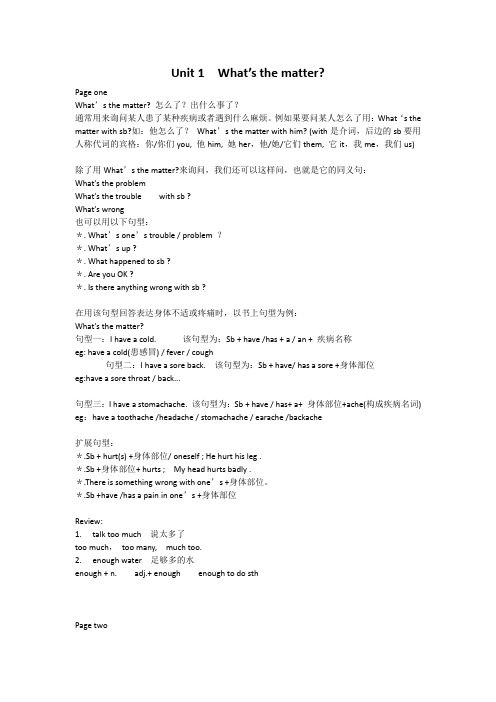
Unit 1 What’s the matter?Page oneWhat’s the matter? 怎么了?出什么事了?通常用来询问某人患了某种疾病或者遇到什么麻烦。
例如果要问某人怎么了用:What‘s the matter with sb?如:他怎么了?What’s the matter with him? (with是介词,后边的sb要用人称代词的宾格:你/你们you, 他him, 她her,他/她/它们them, 它it,我me,我们us)除了用What’s the matter?来询问,我们还可以这样问,也就是它的同义句:What’s the problemWhat’s the trouble with sb ?What’s wrong也可以用以下句型:*. What’s one’s trouble / problem ?*. What’s up ?*. What happened to sb ?*. Are you OK ?*. Is there anything wrong with sb ?在用该句型回答表达身体不适或疼痛时,以书上句型为例:What’s the matter?句型一:I have a cold. 该句型为:Sb + have /has + a / an + 疾病名称eg: have a cold(患感冒) / fever / cough句型二:I have a sore back. 该句型为:Sb + have/ has a sore +身体部位eg:have a sore throat / back...句型三:I have a stomachache. 该句型为:Sb + have / has+ a+ 身体部位+ache(构成疾病名词) eg:have a toothache /headache / stomachache / earache /backache扩展句型:*.Sb + hurt(s) +身体部位/ oneself ; He hurt his leg .*.Sb +身体部位+ hurts ; My head hurts badly .*.There is something wrong with one’s +身体部位。
unit1what's the matter单元知识总结
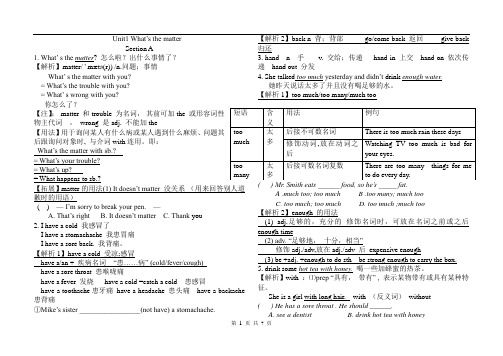
Unit1 What’s the matterSection A1. What’ s the matter? 怎么啦?出什么事情了?【解析】matter/ ' mætə(r)) /n.问题;事情What’ s the matter with you?= What’s the trouble with you?= What’ s wrong with you?你怎么了?【注】:matter 和trouble 为名词,其前可加the 或形容词性物主代词,wrong 是adj. 不能加the【用法】用于询问某人有什么病或某人遇到什么麻烦、问题其后跟询问对象时, 与介词with连用。
即:What’s the matter with sb.?= What’s your trouble?= What’s up?= What happens to sb.?【拓展】matter的用法(1) It doesn’t matter 没关系(用来回答别人道歉时的用语)( ) —I’m sorry to break your pen. —_______A. That’s rightB. It doesn’t matterC. Thank you2. I have a cold 我感冒了I have a stomachache 我患胃痛I have a sore back. 我背痛。
【解析1】have a cold 受凉;感冒have a/an + 疾病名词“患……病” (cold/fever/cough)have a sore throat 患喉咙痛have a fever 发烧have a cold =catch a cold 患感冒have a toothache患牙痛have a headache 患头痛have a backache 患背痛①Mike’s sister _________________(not have) a stomachache.【解析2】back n 背;背部go/come back 返回give back 归还3.hand n 手v. 交给;传递hand in 上交hand on 依次传递hand out 分发4. She talked too much yesterday and didn’t drink enough water.她昨天说话太多了并且没有喝足够的水。
Unit 1 What’s the matter? 课文讲解 知识点 练习
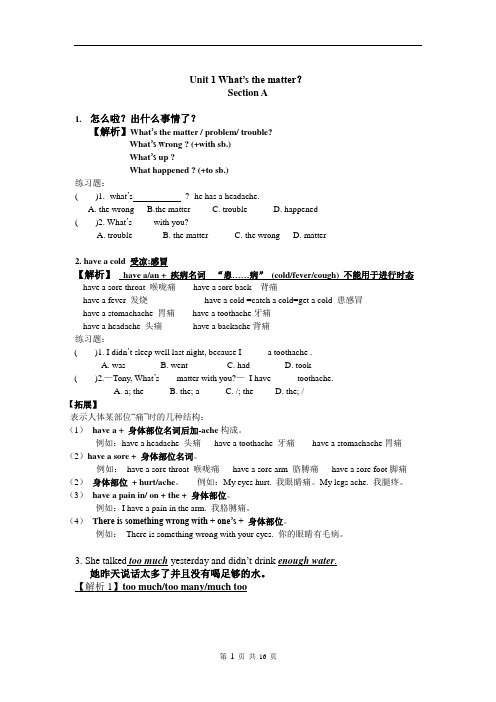
Unit 1 What’s the matter?Section A1.怎么啦?出什么事情了?【解析】What’s the matter / problem/ trouble?What’s w rong ? (+with sb.)What’s up ?What happened ? (+to sb.)练习题:( )1. -what’s ?- he has a headache.A. the wrongB.the matterC. troubleD. happened( )2. What’s ____ with you?A. troubleB. the matterC. the wrongD. matter2. have a cold 受凉;感冒【解析】have a/an + 疾病名词“患……病”(cold/fever/cough) 不能用于进行时态have a sore throat 喉咙痛have a sore back 背痛have a fever 发烧have a cold =catch a cold=get a cold 患感冒have a stomachache 胃痛have a toothache牙痛have a headache 头痛have a backache背痛练习题:( )1. I didn’t sleep well last night, because I _____ a toothache .A. wasB. wentC. hadD. took( )2.—Tony, What’s ___ matter with you?—I have _____ toothache.A. a; theB. the; aC. /; theD. the; /【拓展】表示人体某部位“痛”时的几种结构:(1)have a + 身体部位名词后加-ache构成。
例如:have a headache 头痛have a toothache 牙痛have a stomachache胃痛(2)have a sore + 身体部位名词。
Unit 1 What's the matter?

Unit1What's the matter?本单元单词:matter[ˈmætə(r)]n.问题;事情What's the matter?怎么了?出什么事了?sore[sɔ:(r)]adj.疼痛的;伤痛的have a cold感冒stomachache['stʌməkeɪk]n.胃痛;腹痛have a stomachache胃痛foot[fʊt]n.脚;足neck[nek]n.颈;脖子stomach[ˈstʌmək]n.胃;腹部throat[θrəʊt]n.咽喉;喉咙fever[ˈfi:və(r)]n.发烧lie[laɪ](lay[leɪ])v.躺;平躺lie down躺下rest[rest]v.&n.放松;休息cough[kɒf]n.&v.咳嗽X-ray[ˈeks reɪ]n.X射线;X光toothache[ˈtu:θeɪk]n.牙痛take one's tempreture量体温have a fever发烧break[breɪk]n.间歇;休息take breaks(take a break)休息hurt[hɜ:t](hurt[hɜ:t])使疼痛;受伤passenger[ˈpæsɪndʒə(r)]n.乘客;旅客off[ɒf]adv.&prep.离开(某处);不工作;从…去掉get off下车onto[ˈɒntu]prep.向;朝trouble[ˈtrʌbln.问题;苦恼hit[hɪt](hit[hɪt])(用手或器具)击;打right away立即;马上get into陷入;参与herself[hɜ:ˈself]pron.(she的反身代词)她自己bandage[ˈbændɪdʒ]n.绷带v.用绷带包扎press[pres]v.压;挤;按sick[sɪk]adj.生病的;有病的knee[ni:]n.膝盖;膝nosebleed[ˈnəʊzbli:d]n.鼻出血breathe[bri:ð]v.呼吸sunburned[ˈsʌnbɜ:nd]adj.晒伤的ourselves[,aʊəˈselvz]pron.(we的反身代词)我们自己climber[ˈklaɪmə(r)]n.登山者;攀登者be used to习惯于…;适应于…risk[rɪsk]n.&v.危险;风险;冒险take risks(take a risk)冒险accident[ˈæksɪdənt]n.交通事故kilo[ˈki:ləʊ](=kilogram)n.千克;公斤rock[rɒk]n.岩石run out of用尽;耗尽knife[naɪf]n.(pl.knives[naɪvz])刀cut off切除blood[blʌd]n.血mean[mi:n](meant[ment])v.意思是;打算;意欲get out of离开;从…出来importance[ɪmˈpɔ:tns]n.重要性;重要decision[dɪˈsɪʒn]n.抉择;决定control[kənˈtrəʊl]n.&v.限制;约素;管理be in control of掌管;管理spirit[ˈspɪrɪt]n.勇气;意志death[deθ]n.死亡give up放弃nurse[nɜ:s]n.护士Judy['dʒu:di]朱迪(女名)Nancy[ˈnænsi]南希(女名)Mandy['mændɪ]曼迪(女名)Aron['erən]Ralston['rɔ:lstən]阿伦·罗尔斯顿Utah['ju:ta:]犹他州(美国)重点单词详解:1.matter n.问题;事情短语:what's the matter常用于询问某人患了何种疾病,遇到了什么困难、烦恼或周边出了什么状况等该句型也可用于询问某物出了什么故障,其后可接with sb./sth.表示“某人/某物怎么了?”。
Unit1what’sthematter_SectionA知识点梳理人教版八年级英语下册

人教版八年级下册英语课本知识点梳理Unit 1 wh at’s the matter? sectionA课文内容:What's the matter? 怎么了? (教材第1页)【用法详解】What's the matter? 怎么了?/出什么事了?常用于询问某人患了何种疾病,遇到了什么困难等,也可用于询问某物出了什么故障,其后可接with sb./sth.,表示“某人/某物怎么了?”。
其中matter 用作名词,意为“问题;事情”matter前须加定冠词the。
【例句】What's the matter? 怎么了?Bad luck.I lost my pen. 真倒霉,我弄丢了钢笔.What's the matter with him? 他怎么了?He has a sore back.他背痛【拓展】matter[动词] 要紧;有关系多用在否定句、疑问句或条件句中It doesn't matter.没关系。
(通常用来回答对方的道歉)I have a cold. 我感冒了。
(教材第1页)【用法详解】have a cold (患)感冒。
其中have 用作及物动词,意为“患(病);遭受(病痛)”,常用于结构“have a/an +疾病名称”表示患病或身体某部位不舒服。
此时它不能用于进行时态,其第三人称单数形式为has,过去式为had。
常见的表示病痛的短语还有:have a fever 发烧have a toothache 牙疼have a headache头痛have a cough 咳嗽have a stomachache胃痛Do you often have a cold? 你经常感冒吗?Jim had a stomachache after supper yesterday.吉姆昨天晚饭后胃痛。
l have a stomachache.我胃痛。
( 教材第1 页)【用法详解】stomachache [名词]胃痛;腹痛是由“名词stomach(;腹部)+ache(疼痛)”构成的复合名词。
Unit 1 What’s the matter讲义(带答案)

Unit 1 What’s the matte r?讲义一、重点知识点梳理1. 怎么啦?出什么事情了?【解析】matter/ ' mætə(r)) /n.问题;事情【注】:matter 和trouble 为名词,其前可加the 或形容词性物主代词,wrong 是adj. 不能加the 【同义】遇到麻烦2. I had a cold.我感冒了。
have a cold=catch a cold=have the flu感冒have a fever 发烧have a cough咳嗽have a stomachache胃疼,肚子疼have a toothache牙疼have a headache头疼3. 身体部位+ ache(疼痛)构成新的复合词stomach+ache=stomachache head+ache=headache tooth+ache=toothache back+ache=backache 后背痛ear+ache=earache耳朵痛4. much too+ 形容词,意为太...... ,too much+名词,意为很多,大量。
5. enough【形容、副词】足够的/地,enough放在名前,形副后。
good enough足够好,enough money=much money6. lie down躺下,lie 躺,躺着,现在分词:lying过去式lay;lie说谎,过去式lied7. maybe“或许”,常用于句首,表示可能性,后加句子。
Maybe you are right.may be,是情态动词+be的结构,意为“可能,也许”,后加名词、代词或形容词。
He may be angry. sound like+名词代词和从句:It sounds like you don’t know the truth.It sounds like a good idea. sound+形容词,“听起来,好像”,The music sounds nice.9. need 需要,实义动词need+名词,需要某物;need to do sth.需要做某事,主语通常是人,表示人主动的动作:You need to listen carefully during class.need doing sth.主语通常是物,表示被动的动作:Your dirty clothes need washing.9.Run out &run out ofrun out 的主语一般是sth, 如:His money soon ran out. ran是run的过去式run out of的主语是sb. 如:he ran out of the money.10. I had a cold.我感冒了。
人教版初中八年级下册英语:Unit 1 What's the matter讲解和练习

Unit 1 W hat’s the matter?教学目标1.掌握本课重点短语和句型。
2.掌握情态动词should的用法。
3. 掌握反身代词的用法。
知识梳理一、重点短语have a cold/stomache 感冒/胃痛too much 太多lie down 躺下see an X-ray 拍个X光片fall down 摔倒take one’s temperature 量体温be in control of 掌管;管理cut off 切除take a risk 冒险make a decision/make decisions 做决定thanks to 多亏;由于run out (of) 用尽;耗尽take breaks 休息get off 下车to one’s surprise 使……惊讶的get into 陷入;参与get out of 离开;right away 立即;马上need to do sth 需要做某事see sb doing sth 看见某人正在做某事ask sb sth 询问某人某事expect sb to do sth 期待某人做某事have problems (in) doing sth 做某事有困难be/get used to doing sth 习惯于做某事seem to do sth 好像做某事二、重点句型1.询问健康问题及遇到麻烦时的表达What’s the matter(with sb)?What’s wrong (with sb)?What’s the trouble (with sb)?/What’s one’s trouble?What happened( to sb)?Are you OK?Is there anything wrong (with sb)?2.要表达身体某一部位疼痛或不舒服①sb+have/has+身体部位-ache( headache/toothache…)She had a stomachache last night.②sb+have/has a sore+身体部位He has a sore throat.③sb+hurt(s)+身体部位或反身代词He hurt his leg.④sb+have/has a pain in one’s +身体部位I have a pain in my chest.⑤There is something wrong with one’s+身体部位There is something wrong with my right eye.三、should的用法Should是情态动词,意为“应该;应当”其后接动词原形,无人称和数的变化。
unit1 what's the matter总结
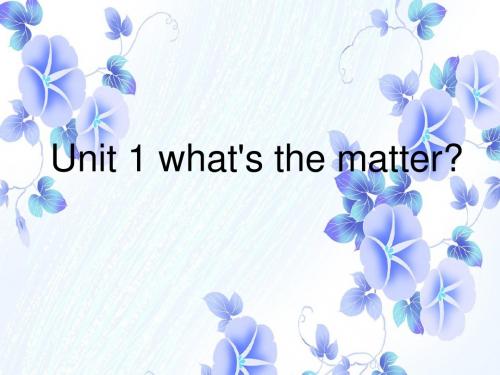
3. What should she do?
她该怎么办呢? Should I take my temperature? 我应该量一下体温吗? should是情态动词,可表示建议,意思是“应当, 应该,最好”,其否定形式是shouldn’t,基本句 型是: 主语+ should/shouldn’t + 动词原形. .. ①You should lie down and rest. 你应该躺下休息一会儿。 ② You shouldn’ t go out at night. 你晚上不应该出去。
2.在英语中,表达“疼痛或不舒服”时的常用结
构: (1)主语+have/has+病症 (2)主语+have/has+a+sore+发病部位 sore 是一个独立的形容词,指的是身体某一部 位的酸痛。如:sore back, sore throat,sore back,sore neck. (3)主语+have/has+a+部位-ache -ache作后缀,常与表示身体部位的名词合成一 个新词,表身体某部位疼痛,如: toothache ,headache , stomachache
23. s h o u t fo r h e lp 大声呼救 24. w ith o u t th in k in g tw ic e 没有多想 25. g e t o ff 下车 26. h a v e a h e a rt p ro b le m 有心脏病 27. to o n e ’ s s u rp ris e 使...惊讶的 28. th a n k s to 多亏了 ;由于 29. in tim e 及时 30. s a v e a life 挽救生命 31. g e t in to tro u b le 造成麻烦 32. rig h t a w a y 立刻;马上 33. b e c a u s e o f 由于
Unit1.What's the matter

Unit 1. What's the matter?1.What’s the matter (with sb./sth.)?=What’s wrong (with sb./sth.)?=What’s the matter/trouble(with sb./sth.)?......怎么了?......出什么事了?【拓展】(1)matter 还可以做动词,意为“要紧;有关系”,主要用于否定句,疑问句和条件句中。
如:It doesn’t matter. 没关系(2)no matter...意为“无论...”,后面接由where,what,how,why等引导的从句。
2.too much 太多;(常用来修饰动词或者不可数名词,还可以用作名词短语充当主宾表语)much too 太;非常,相当于very3.辨析sore,ache,pain(1)sore指因发炎引起的疼痛,常用结构为“have a sore+身体部位”;(2)ache常与身体部位名词构成合成词,指某部位疼痛,常用结构为“have a 身体部位-ache”;(3)pain指身体某部位疼痛,常用结构为“have/feel a pain in the/one’s+身体部位”。
4.lie down and rest躺下休息lie v. 位于;躺(lie-lay-lain-lying)v. 说谎(lie-lied-lied-lying)n. 谎言5.for too long= for a long time 持续太长时间(for后接一段时间)6.see sb. doing sth. 看见某人正在做某事7.expect sb. to do sth. 期望/预料某人去做某事expect to do sth. 预计/预料去做某事wish to do sth. 希望做某事wish sb. to do sth. 希望某人做某事hope to do sth. 希望做某事(注意:没有hope sb. to do sth.的表达)8.to one’s surprise 令某人惊讶的是surprising adj. 使人惊奇的9.辨析agree to, agree on, agree with(1)agree with +sb. 或意见/看法“同意...;赞成...”(2)agree to +提议/办法/计划“同意...;赞成...”(3)agree on sth. “就...取得一致意见”10.thanks to 幸亏;多亏...;由于...的帮助(相当于because of或者with the help of...)11.in time 及时on time 准时12.It's +adj./n./v-ed+that 从句结构eg. It’s reported that the weather is getting worse.13.get into trouble 造成麻烦(或烦恼)have trouble (in) doing sth. 做某事有困难have trouble with sth. 因某事而苦恼ask for trouble 自寻烦恼in trouble 陷入困境14.run out用完;用光(主语为物,不加宾语)run out of 用完;用光(主语为人,介词of之后加宾语)15.cut off 切除;切断16.so that 以便;为了adj.+复数名词/不可数名词such+ a/an +adj.+可数名词单数+that 从句adv.+主语+谓语so+ adj.+a/an +可数名词单数+that 从句【注意】“多多少少也用so(little,few,much,many)”17.mean doing sth. 意味着做某事mean to do sth. 打算做某事18.tell of 描述;叙述19.the importance of doing sth. (做)某事的重要性20.make a/one’s decision(s)=make up one's mind 下决心;作出决定21.辨析die, dead,death,dying(1)die v. 死亡(2)dead adj. 死的;无生命的(3)death n. 死亡(4)dying adj. 垂死的22.have/catch a cold 感冒23.have (got)a stomachache 胃痛24.take one's temperature 测体温25.be used to (doing) sth. 习惯于做某事26.keep on doing sth. 继续或坚持做某事27.take a risk=take risks 冒险at risk 在危险中at the risk of 冒...的危险28.be in control of 控制29.give up 放弃30.by oneself 独自一人。
Unit1 what'sthematter 知识点与短语

Unit1 What’s the matter?Section A1. 你怎么啦?What’s the matter with you?= What’s your trouble?=What’s the troublewith you ?= What’s up with sb?= What’s wrong with you ?= What happened to you?【拓展】It doesn’t matter 没关系as a matter of fact= in fact事实上, 实际上2. 我背痛。
I have a sore back.=I have a backache.= I have a pain in the back.=My back hurts.3. too much太多+不可数名词或放在动词之后too many 太多+可数名词复数much too太+形容词或副词4.enough 的用法(1) 修饰名词时,可放在名词之前或之后(2) 修饰adj./adv时,放在adj./adv 后(3) enough + to do sth5.表达建议的句型:1)…should / shouldn’t do…2)…can do…3)Why not do...?4)Would …like to do…?5)Let's do...6)Shall we do…?7)What / How about doing...?8)You'd better do ...6.情态动词Must? ---…needn’t / not have toMay?---…can’t / mustn’tCould?---…can;can’tNeed?---…must7. sound like +名词(短语)听起来像…sound + adj. 听起来….【同】feel / smell / look / taste8. need v 需要(1) 做情态动词need do(2) 做实义动词need to do(3) 表被动need doing9. see sb. do sth 看见某人做某事(强调全过程)see sb. doing sth 看见某人正在做某事(强调正在发生)【同】watch / look at / hear /listen to /feel /find /…10. lie →lay →lain v 躺下,(现在分词lying ).11.24-year-old 24岁的“数词+名词+形容词”构成复合形容词,名词用单数。
八下Unit 1 What's_the_matter?

Unit1 What’s the matter?
Language goals: Talk about your health problems and accidents;Give
advice.谈论健康问题,提意见。
should用作情态动词,后接动词原形,没有人称和数的变化。 should的否定形式为should not,通常缩写为shouldn’t。 should有以下几种常见用法: 1.用于提出建议劝告别人。例如:—Tom,I have a toothache.汤姆,我牙痛。—You should see a dentist.你应 当去看牙医。—I’m not feeling well these days.I hava bad cough.这些天我身体不适,老是咳嗽。—You shouldn’t smoke so much,think.我认为你不该抽这么多 烟。 2.用于第一人称疑问句中,用于征求对方意见。例 如:Should I help you wash clothes?要不要我帮你洗衣 服?Should I go there by bus?我是否应当坐公共汽车去那 里?
part of the body.
g m c K i ____arm ____back ____ear ____eye ____foot b f ____hand____head ____leg ____mouth a l h d j e ____neck ____nose ____stomach ____tooth
Grammar Focus
What's the matter?怎么了? matter n.“毛病、 麻烦事”,“What's the matter (with sb)? 句型。用来询问某人患了何种疾病。 what's the matter with him? He had a headache. matter v.意为"有关系;要紧"。通常用于否定句和疑问句,句中 常常含有what, who, where, if等词,一般以it作主语。例如: It doesn't matter if I miss the train, because there's another later. 我要是误了这趟火车也不要紧,因为晚些时候还有一趟车呢。 Does it matter a great deal to her whether they come or not? 他们 是否来,这与她有很大关系吗? no matter+特殊疑问词;意为"无论......",用来引导状语从句。 如: No matter where you go, please let me know. 无论你去哪里, 请告诉我一声。
Unit1what‘s_the_matter
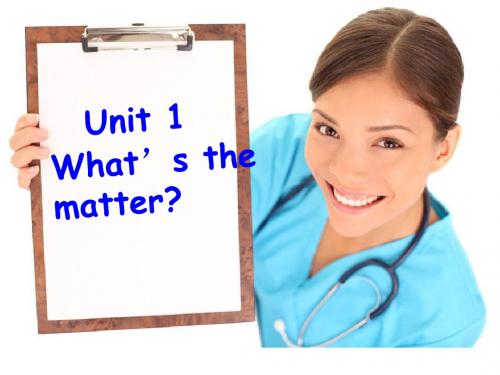
常用sore 修饰的词: throat leg foot eye 常加后缀-ache构成的词: head tooth stomach ear
两者都可用的词:back
a. 喉咙痛 b. 背痛 c. 牙痛 d. 头痛 e. 胃痛 f. 感冒 g. 发烧
Look and say
have a sore throat have a sore back have a toothache have a headache have a stomachache
1. fever 2. stomachache
3. cough and sore throat
4. toothache 5. cut myself
a. lie down and rest
b. drink some hot tea with honey c. see a dentist
and get an X-ray
1b: Listen and look at the picture.
Then number the names (1-5).
Nancy__4___ Sarah__1___ David__2___ Ben___3____ Judy___5__
Conversation 1
A:You don't look well. Your face looks a bit red. B: Yeah, and my head feels very hot. What should I do? A: Maybe you have a fever. You should take your temperature. B: Yes, you're right.
So last night, I got a stomachache. I almost couldn't get myself out of bed this morning.
- 1、下载文档前请自行甄别文档内容的完整性,平台不提供额外的编辑、内容补充、找答案等附加服务。
- 2、"仅部分预览"的文档,不可在线预览部分如存在完整性等问题,可反馈申请退款(可完整预览的文档不适用该条件!)。
- 3、如文档侵犯您的权益,请联系客服反馈,我们会尽快为您处理(人工客服工作时间:9:00-18:30)。
Unit 1 What' the matter?Section A 第1课时(1a〜2d)自主学习方案1. 自学生词,并记住拼读及拼写。
2. 预习课本,找出重点短语及句子(见学案上的自学导练部分)课堂导学方案Step 1情景导入T:(Show some pictures) What’s the matter with them?环节说明:由图片入手,图文并茂,引起学生的学习兴趣,也检查学生的预习情况。
Step 2 完成教材1a—1c的任务1. 学生朗读la中的单词,教师纠正错误读音,然后学生识记单词并将单词和身体部位匹配。
2. 让学生仔细观察la图片中的人物,然后认真听录音,完成课本上lb的听力任务并跟读。
3. 结对练习lc中的对话,并请一些学生表演他们的对话。
环节说明:听说结合,向学生传达语言目标,通过结对对话练习,使语言目标得以强化。
Step 3 完成教材2a—2d的任务1. 认真观察2a图片,按听到的对话顺序给图片标号,集体核对答案。
2. 认真阅读2b中的单词和短语,再听一遍录音,将问题和建议匹配,完成后集体核对答案,并让学生跟读。
3. 让学生利用2a、2b中的信息仿照2c的形式练习对话,并要求几组同学表演对话。
4. 大声朗读2d中的对话,读熟后与同伴结对练习,分角色表演对话。
Step 4问题探究1. What' the matter?你怎么了 ?这句话通常用于询问别人身体有什么不舒服或有何麻烦,后跟 with 构成:What ’s wrong/the matter with…?或What happened to…?等。
回答时可用I have …。
2. should的用法。
should是情态动词,本单元表示“应该,应当”它比must 的语气要委婉,用来表示向对方提出建议或忠告,或者表示某种义务或责任。
其否定形式为sho uldn’t +动词原形,意思是“不应该,不应当”教学反思本课以图片入手来引入情景话题,引起学生的兴趣,并通过结对练习的方式让学生之间互动起来,能提高学生的口语水平和表达能力。
Section A 第2课时(3a~4c)3. 再次细心阅读短文,理解每一句话的意思.4. 教师点拨短文中出现的重点和难点。
5. 熟读短文.6. 小结训练。
( B) (1)You mustn’t the bus u ntil it stops.A. get upB. get offC. get downD. get over(克服,恢复)( C ) (2) We all expect the students the singing competiti on.A .win B. beatC . to win D. to beat( A ) (3)To surprise,parents bought a new computer for .A. her ; her ; herB. her ; her ; hersC. she ; hers ; herD. hers ; her ; her( B ) (4) the kind man,the girl was saved.A. Thank forB. Thanks toC . Because D. Thanks a lotStep 3完成教材3c的任务1.认真阅读3a短文,思考3c中的问题。
2.组讨论发表自己对三个问题的观点。
Step 4 完成 Grammar Focus —4c 的任务1. 朗读Grammar Focus中的句子。
2. 参考学案上的单元语法精讲精练,引导学生归纳语法知识。
3. 完成4a—4b的练习。
4. 教师纠正学生答案。
5. 小组中一个学生扮演病人,其他学生猜测病人的疾病并且给出好的建议,完成后邀请几组学生展示,完成4c。
Step 5问题探究1. The boy with his parents is (be) asleep.(介词短语不作主语)。
2. He expects to receive (receive) a gift.(不定式作宾语)( A )3. Thanks the teacher,or we can’t succeedA toB forC in由句意可知,使用Thanks to“多亏了”。
Section B 第三课时(1a—1d)预习课本,找出重点短语及句子。
读记后完成自学导练作业。
方案 how to deal with the problems.环节说明:由生活中经常出现的意外为话题引出本节课所要学的内容,贴近生活,引起学生的学习兴趣。
Step 2完成教材1a的任务1. 让学生仔细观察1a中的三幅图片,然后根据图片信息回答问题:What happened to them?2. 小组讨论出现1a中的意外情况时,我们应该怎么办?然后将1a中所给出的句子按正确的顺序排序,集体核对答案。
3. 两人一组利用1a中的信息编练对话,并邀请几组学生表演对话。
参考案例A:What’s the matter with you?B:I fell down and hurt my back.A:You should go to hospital to get an X-ray and rest for a few d ays.4. 小结训练汉译英。
(1) 在上面扎上绷带。
Put a bandage on it.(2) 在自来水下冲洗。
Run it under water.(3) 把你的头仰起来。
Put your head back.环节说明:通过本环节的学习让学生知道出现这些意外后的应急措施,同时,对话练习又提高了学生的口语表达能力。
Step 3完成教材1b—1d的任务1. 学生齐读1b中的句子,为听力练习做好准备。
2. 认真听录音,将对话中护士所提的问题标注出来,集体核对答案。
3. 再认真听一遍录音,将相应问题治疗方案的字母与在冋题后面,完成1 b,集体核对答案。
4. 听第三遍录音,并跟读,整体感知对话。
5. 利用1b、1c中的信息,仿照1d的形式两人一组来练习对话,并邀请几组学生表演对话。
参考案例A: Who came to your office today?B: First,a boy came in. He hurt himself in P . E. class.A: What happened?B:…6.小结训练。
(C)The teacher tells the students in the hallway.A. not run C . not to run StepB . don' run D. doesn’t to run4问题探究happen的用法1.这个故事发生在2003年。
This story happened in 2003.2. 今天上午她发生了交通事故。
An accident happened to her this morning.3. 昨天我碰巧在街上遇到了我的一个朋友。
I happened to see one of my friends in the street.教学反思本课时情景导入贴近实际生活,并通过问答和小组讨论的形式增强学生课堂参与性和趣味性,起到了较好的教学效果。
Section B 第 4 课时(2a〜2b)课堂导学方案Step 1 情景导入T : Hello,everyone! Have you ever heard of Aron Ralston? He is an American man who is interested in mountain climbing. He has many e xperiences in climbing mountains. But unluckily,he lost his arm when he climbed the Utah. Do you want to know what happened to him? Let’s read the story together.环节说明:以Aron Ralston的故事为话题,设置悬念,引起学生的好奇心,引出本节课的学习内容。
Step 2 完成教材2a—2b的任务1. 学生朗读2a中的短语,教师纠错,两人一组互相提问背诵。
2. 在运动的时候可能出现一些意外或是问题,看看A,B和C所代表的三项运动中经常出现的意外或是冋题分别是什么,然后将代表三项运动的字母A,B 和C分别写在可能出现的意外或问题前面的横线上。
完成后小组内互相交流答案。
3. 认真阅读短文,在你不理解的语言知识点下面画横线,然后在字典里查询不理解的单词及短语。
4. 教师让学生再读短文,回答下列问题以检查学生的理解情况。
(1) When did Aron almost lose his life?(2) How did he save his life?(3 ) What does “between a rock and a hard place” mean?5. 教师根据学生阅读理解情况点拨短文中出现的重点和难点。
6. 熟读课文,识记背诵知识要点。
7. 小结训练。
(A)(1) The boy stay up,but now he going to bed early.A. used to,is used toB. is used to,used toC. used to,used to(D)(2)The thief the lift and ran away.A. got offB. got onC. got intoD. got out of(B)(3) He sits in the front of the classroom he can hear the teacher clearly.A. so onB. so thatC. in order toD. so… that…(C)(4) The branch(树枝)of the tree is dead. So we should .动词加介词时,放后面。
动词加副词时,放中间。
A. cut offB. cut off itC . cut it off D. cut them off(C)(5) After a short rest,they keep on .A. to workB. workC. workingD. worksStep 3 问题探究1. be used to 的用法他习惯于自己照顾自己。
He is used to looking after himself.used to do sth. “过去常干”;be used to sth. /doing sth. “习惯(干)……”。
